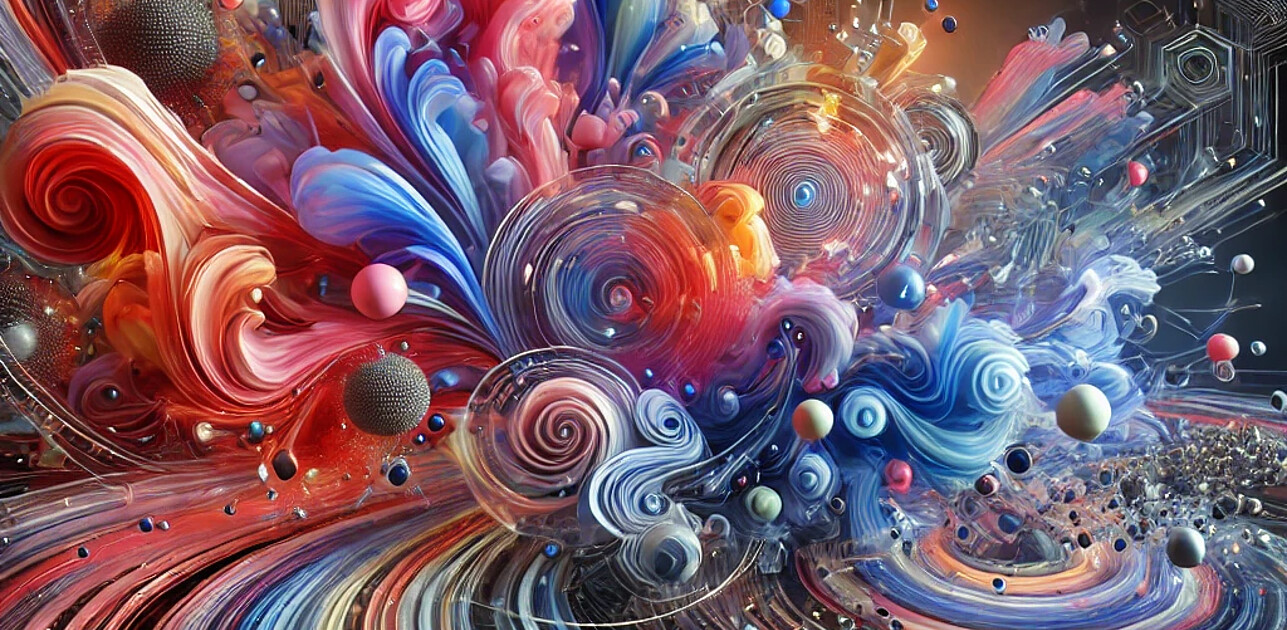

Article: Wednesday, 09 October 2024
Art generated by artificial intelligence (AI) suffers a market bias. It’s worth less than conventional art made by human artists – like paintings, sculpture or photography – because it’s perceived as being less creative and people are not willing to pay as much for it. But there’s more and more of it, so isn’t it time that we update what we consider as ‘art’ and redefine who is considered to be an artist? This issue is at the intersection between technology, creativity, and market dynamics, and was a central question in research conducted by Merel Meijer for her MSc Marketing Management at Rotterdam School of Management, Erasmus University (RSM).
Her research addresses a crucial gap in understanding consumer behaviour towards AI in art. “The introduction of AI in the visual arts sparked a paradigm shift and has led to new platforms and galleries for AI-generated artworks,” she explains. “But there’s notable scepticism among potential buyers about its value and creativity. I wanted to know what’s behind the traditional belief that creativity is solely a human attribute.”
She investigated how labelling artworks as ‘AI-generated’ affects people's perception of it, and their willingness to pay for it. Her thesis, The influence of AI labeling on Art Valuation: Perceived Creativity as a mediator on Willingness-to-Pay first sets out how AI's role in art is rapidly expanding and has created a lot of debate. Merel dedicated her thesis ‘to artists who push the boundaries of creativity, embracing new technological developments as opportunities to expand what is considered art and redefine who is considered an artist’.

“People do embrace AI-art; there are new platforms and galleries for it and established museums and auction houses show interest in it,” she said. “For example, the MoMA in New York acquired Rafik Anadol’s Unsupervised installation that’s based on datasets played through machine-learning classification models. Another example is the AI-generated painting Portrait of Edmond Belamy that recently sold for $ 432,000 at a Christie’s auction.
“But AI-generated art is also hugely criticised for not being creative and unique, and this leads to scepticism among potential buyers about its future value and creativity. That’s why I investigated to what extent knowing that an artwork is AI-generated influences peoples’ perception of its creativity, and consequently, their willingness to pay for it.”
Merel’s experiment set up an online art gallery to examine what happens to consumers’ willingness to pay when artworks are clearly labelled as AI-generated, and to find out more about the role the artworks’ perceived creativity plays in this relationship.

For her online gallery, she first created two artworks using the DALL-E AI tool that was itself instructed by a ChatGPT prompt. She measured people’s perception of both artworks. Based on their answers, she selected one of the two AI-generated artworks for a main study, an online quantitative survey of 248 people. Participants were divided into two groups: one viewed the artwork labelled as AI-generated, and the other viewed the same artwork without knowing that it was AI-generated.
She measured how the participants perceived the creativity in the artwork and how much they would be willing to pay for it, as well as their understanding of AI generated art. She also asked about their trust in AI – did they think it could do the same sort of tasks that were generally done by humans?
The results confirmed that there is a market resistance towards AI art, and its value is less than art made by human artists. Merel noted that labelling the art as AI-generated did indeed significantly reduce participants' willingness to pay for it and lowered their perception of the creativity in its production. But the responses also had more nuance.
While responses showed that consumers value human-created art more than AI-generated art, probably because of the dominant and traditional views of human creativity, there appears to be real interest in AI-generated art, even if people know it is AI-generated.
About half of the respondents who knew the artwork was AI-generated were willing to pay more than € 200 for it, and about 20 per cent of them were willing to pay more than € 500.
And people who trust AI to perform human tasks and who understand how AI create artworks actually perceive that there’s more creativity in the AI-labelled art than those people who don’t trust AI and don’t understand how it creates art.
But trust and understanding of AI doesn’t necessarily mean people are willing to pay more for AI art than they would for a human-created artwork. In general, she says, these findings underscore the challenges in gaining market acceptance for AI art, and emphasise the need for communication strategies to enhance its perceived value and creativity.
Based on these results, here’s Merel’s key recommendation for selling AI art: emphasise its aesthetic qualities and explain the creative process that went into it, rather than just bluntly stating its AI origin. This is the way to counteract negative biases and gradually build acceptance and appreciation, recommends Merel Meijer.
“My results highlight the complex interplay between emotional and cognitive responses to AI in art,” commented Merel. “Given the potential it holds, this research invites further exploration into other dimensions of this topic, potentially leading to a more comprehensive understanding of the intersections between technology, creativity, and market dynamics, and encouraging a broader acceptance of AI as a legitimate tool for artistic creation, fostering a more inclusive view of creativity.”
Research was conducted by Merel Meijer under the supervision of Professor Yvonne van Everdingen [JW1] and co-reader Yaser Al-Dhabyani. There are more investigations into the kind of digital experiences involving technology, creativity, and market dynamics within the expert practices of the Erasmus Centre for Data Analytics (ECDA). Within ECDA, Prof. Yvonne van Everdingen, Professor of Marketing and Innovation at RSM, focuses on immersive technologies such as AR and VR in the expert practice of Virtual and Augmented Reality. The soon-to-be launched expert practice of AI in Art and Digital Culture within ECDA, is led by Dr Trilce Naverrete, Assistant Professor Arts and Culture at the Erasmus School of History, Culture and Communication at Erasmus University Rotterdam.
Merel Meijer’s thesis The influence of AI labeling on Art Valuation: Perceived Creativity as a mediator on Willingness-to-Pay (WTP) from June 2024 is now archived in the Erasmus University Thesis Repository.

Science Communication and Media Officer
Rotterdam School of Management, Erasmus University (RSM) is one of Europe’s top-ranked business schools. RSM provides ground-breaking research and education furthering excellence in all aspects of management and is based in the international port city of Rotterdam – a vital nexus of business, logistics and trade. RSM’s primary focus is on developing business leaders with international careers who can become a force for positive change by carrying their innovative mindset into a sustainable future. Our first-class range of bachelor, master, MBA, PhD and executive programmes encourage them to become to become critical, creative, caring and collaborative thinkers and doers.
